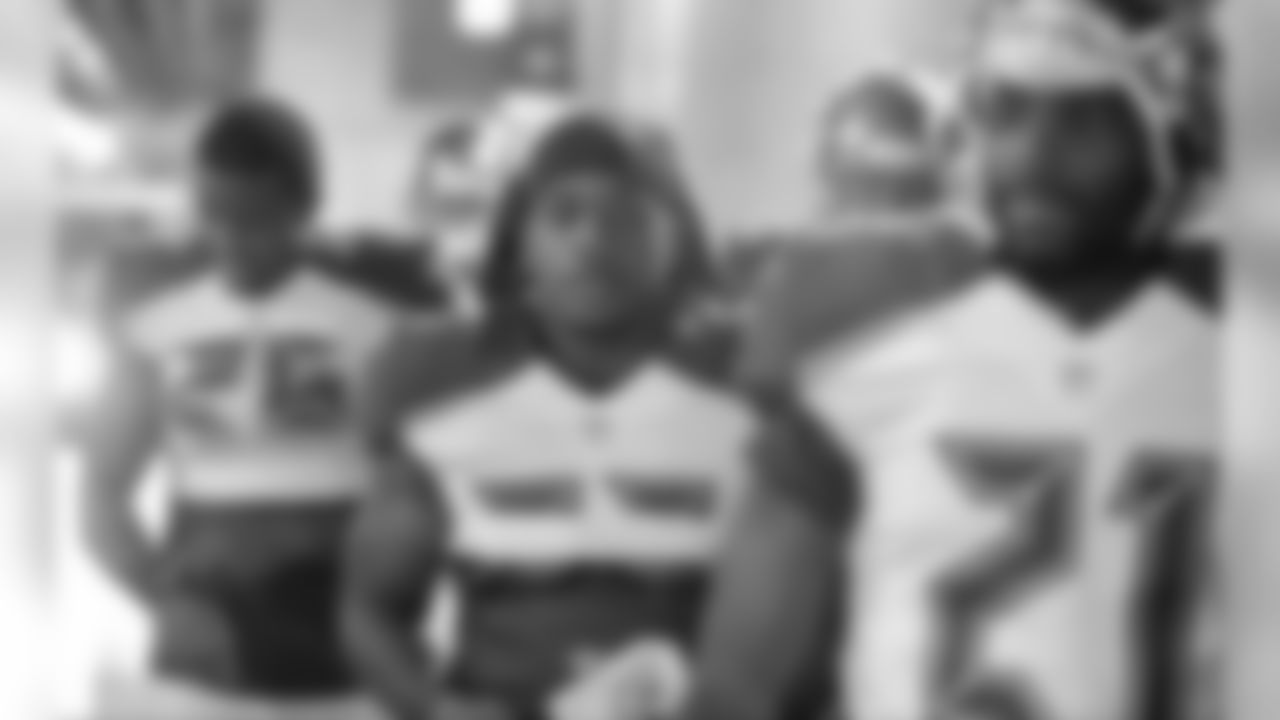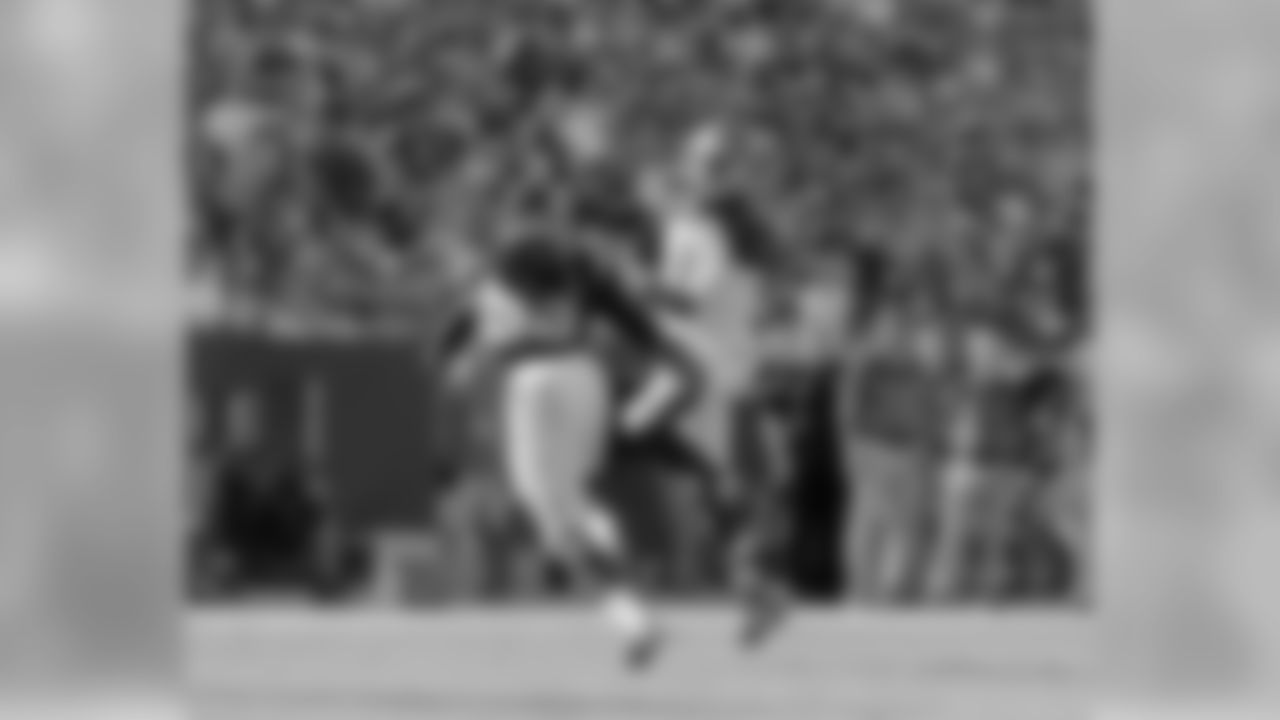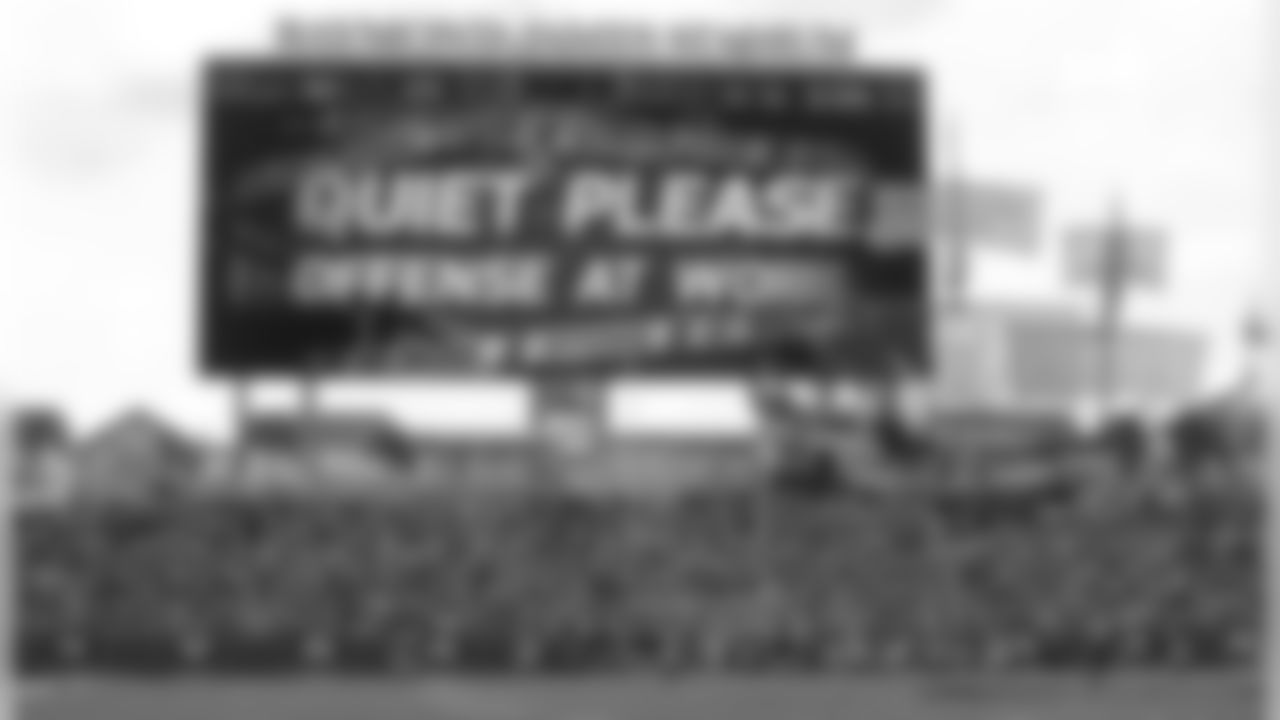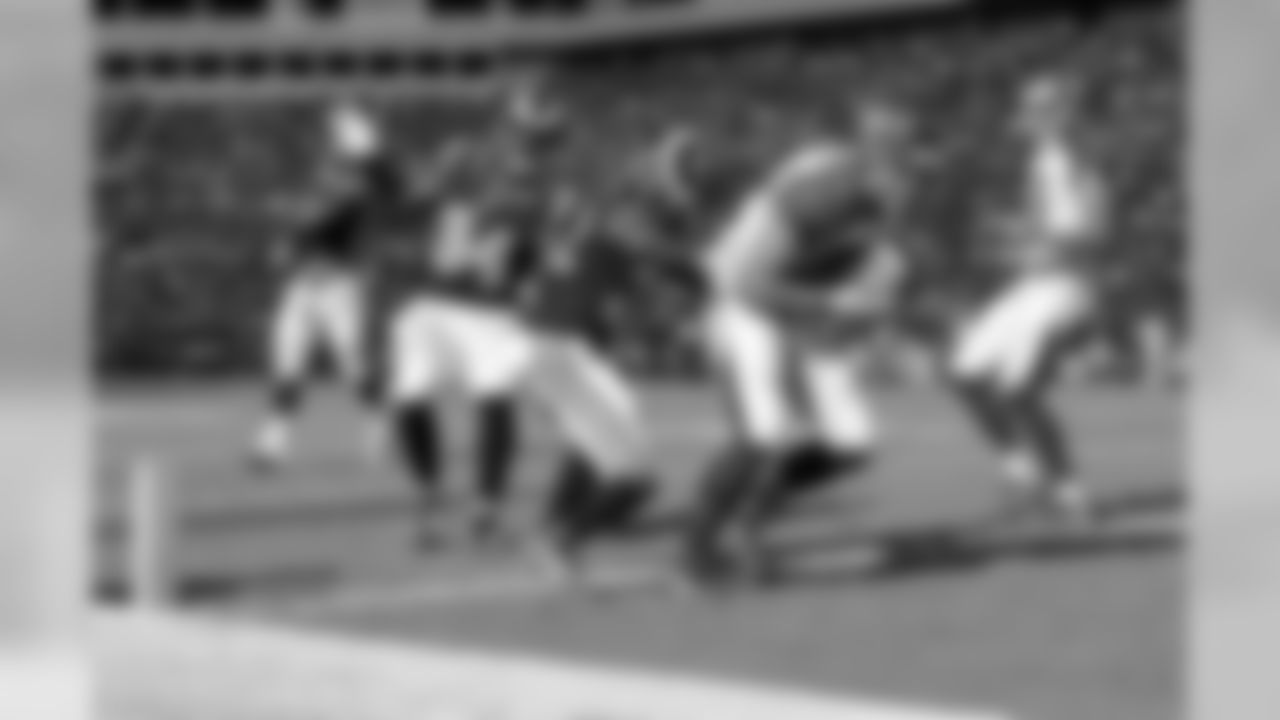For most NFL teams, in most in-season weeks, Tuesday is the player's day off. It's a chance to rest, regroup and – win or lose the previous weekend – turn the page to the next opponent.
It's also a perfect time for us to discuss the hottest topics surrounding the Tampa Bay Buccaneers. And for that reason, the One Buc Mailbag is back! Every Tuesday, I'll be fielding a handful of questions from the fans, but you can send them in all throughout the week. The easiest way is to hit me up on Twitter (@ScottSBucs, using #BucsMailbag), but if 140 characters isn't quite enough to get your point across, you can also send an email to tbbsocial@buccaneers.nfl.com.
This week, fans wanted to know about the Bucs' record in late-afternoon games, the reasons behind an unusual number of "explosive" plays against Tampa Bay's defense and Kwon Alexander's chances of winning a Player of the Month award. Let's get to it.
1. We always seem to drop the 4o'clock games, no matter the opponent. I wonder what our all time record in 4o'clock games is.
- Jason Kelly
Okay, this question was actually posted on Facebook, and I don't think it was even intended for this mailbag, but it was too good of a topic to pass up. Jason, I imagine you're about to get a far more thorough answer than you expected.
I would imagine your gut feeling about the Bucs in late-afternoon games is based on recent results because, indeed, Tampa Bay has dropped 11 straight games that began in the 4 o'clock ET hour (either 4:05 or 4:25), dating back to December of 2012. And, of course, the Bucs have already dropped their two late-afternoon games this year, at Arizona and at home against Los Angeles, after winning at Atlanta in Week One with a 1:00 p.m. ET kickoff.
That brings up an interesting distinction. Are you coming at this from your own viewing perspective (presumably in the Bay area) or from the team's perspective? See, that Week Two game in Arizona actually started at 1:05 p.m. local time, so it wasn't really a late-afternoon game for the players, even if it was for Bay area viewers. My guess is that you're really talking about games that start around 4:00 p.m. locally, as was the case this past Sunday. The NFL typically gives the Buccaneers late starts in their first few home games in an attempt to give everyone a little break from the worst heat of the day. Of course, all that did this past weekend was put the game in the path of a lightning storm that caused an ill-timed 69-minute delay in the action against the Rams, but that's what you get in Tampa in September.
So I'll give you the answer both ways. I should point out that I'm counting on the nifty little Play Index tool on the Pro Football Reference website, which I use a lot and would heartily recommend, even if just to noodle around with for fun. The alternatives were to go through each play-by-play we have on file by hand (a good option if you want to wait a couple weeks for your answer) or to match up results with printed schedules from each season. The problem with that latter method is that schedules printed before the season can change, particularly since the NFL started "flexing" games in the last six weeks of the season.
So, PFR's Play Index it is! Let's see what it turns up.
In games that started in the 4 o'clock hour in Tampa, the Bucs are 42-98 all-time. The first late-afternoon win for the team was on Sept. 24, 1978, a 14-9 decision over the Atlanta Falcons. The second, somewhat coincidentally, was against the Rams on Sept. 23, 1979, with the Bucs prevailing 21-6. Both of those games were played at old Tampa Stadium. The Bucs first win in a game that started in the early-afternoon locally but started in the 4 o'clock hour for Tampa viewers was at San Francisco, a 24-23 nail-biter on Oct. 26, 1980.
The most recent late-afternoon win for the Bucs was that memorable Doug Martin game in Oakland, when the then-rookie back ran wild for 251 yards and four touchdowns. That one started at 1:05 in California, 4:05 in Florida. The last time the Bucs won at home in the late-afternoon was the season-opening, 16-10 win over Carolina in 2012 (Sept. 9).
A behind-the-scenes look at the Buccaneers' game against the Rams.

Bucs vs. Rams

Bucs fan

Bucs Cheerleaders Lindsey and Brooke with fans

Bucs fan

77 OL Caleb Benenoch

Bucs fans

32 RB Jacquizz Rodgers

83 WR Vincent Jackson

Run Game Coordinator and Offensive Line Coach George Warhop

58 LB Kwon Alexander

98 DT Clinton McDonald

Head Coach Dirk Koetter

93 DT Gerald McCoy

58 LB Kwon Alexander

76 OT Donovan Smith, #74 G Ali Marpet, and #64 OT Kevin Pamphile

Bucs fan

Bucs Cheerleader Lindsey

84 TE Cameron Brate, #62 C Evan Smith, and #93 DT Gerald McCoy

13 WR Mike Evans

84 TE Cameron Brate

62 C Evan Smith, #57 DE Noah Spence, and #37 S Keith Tandy

Captain Fear

Bucs flag holders

Bucs flag holder

29 DB Ryan Smith and #69 OT Demar Dotson

30 S Bradley McDougald

28 CB Vernon Hargreaves

Bucs vs. Rams

24 CB Brent Grimes

51 LB Daryl Smith

93 DT Gerald McCoy

Bucs vs. Rams

Bucs vs. Rams

27 CB Johnthan Banks, #57 DE Noah Spence, and #93 DT Gerald McCoy

Bucs vs. Rams

Bucs vs. Rams

Bucs vs. Rams

93 DT Gerald McCoy, #98 DT Clinton McDonald, #54 LB Lavonte David, and #3 QB Jameis Winston

98 DT Clinton McDonald, #54 LB Lavonte David, #3 QB Jameis Winston, and #83 WR Vincent Jackson

Special Teams Coordinator Nate Kaczor

Bucs fans

58 LB Kwon Alexander and #28 CB Vernon Hargreaves

58 LB Kwon Alexander, #54 LB Lavonte David, and #28 CB Vernon Hargreaves

Bucs fans

Bucs fans

54 LB Lavonte David and #93 DT Gerald McCoy

Bucs vs. Rams

Bucs vs. Rams

69 OT Demar Dotson, #84 TE Cameron Brate, #34 RB Charles Sims, and #45 TE Alan Cross

Bucs fans

54 LB Lavonte David

92 DE William Gholston and #23 S Chris Conte

Head Coach Dirk Koetter and #3 QB Jameis Winston

3 QB Jameis Winston

45 TE Alan Cross and #84 TE Cameron Brate

Bucs vs. Rams

Bucs fans

Bucs vs. Rams

93 DT Gerald McCoy

US Olympian Melanie Margalis

US Paralympian Regas Woods

Melanie Margalis, Perry Baker, Marvin Bracy, Kerron Clement, Regas Woods, April Holmes, and Brad Kendell of the US Olympic and Paralympic Teams.

Bucs vs. Rams

Bucs fan

Bucs fans

93 DT Gerald McCoy and #92 DE William Gholston

Bucs fan

32 RB Jacquizz Rodgers

New BV6 scoreboard

Bucs fan

76 OT Donovan Smith and #3 QB Jameis Winston

Bucs Cheerleaders

Bucs Cheerleader Julia

84 TE Cameron Brate

3 QB Jameis Winston

54 LB Lavonte David

Bucs vs Rams

Bucs vs. Rams

13 WR Mike Evans

64 OT Kevin Pamphile, #84 TE Cameron Brate, and #13 WR Mike Evans

New BV6 scoreboards

Bucs fans

Bucs vs. Rams

Bucs vs. Rams

Defensive Line Coach Jay Hayes

Bucs fans

Head Coach Dirk Koetter

54 LB Lavonte David
If you only want to include games that started in the 4 o'clock hour locally (that is, purging out the 1:00 Pacific, Mountain or Central Time Zone starts), the Bucs are 30-55, which is a little bit better. If you want to throw in the 3:00 local starts in the Central time zone (for instance, New Orleans) because that's still late-afternoon, that adds 10 games to the mix, in which the Bucs are 2-8. So that would be a total of 32-63 in local starts in either the 3 or 4 o'clock hours.
Let's list those out and compare:
All 4 o'clock ET starts: 42-98, .300 winning percentage
Only 4 o'clock local starts: 30-55, .353 winning percentage
Only 3 and 4 o'clock local starts: 32-63, .337
Of course, that only really tells us anything if we compare it to the Bucs' record in all games. In its 40-plus seasons, Tampa Bay has recorded a regular-season record of 242-388-1, for a winning percentage of .384. To me, that doesn't represent a terribly significant difference from the .353 mark in 4 o'clock local starts. If you remove those 85 games from the overall total, then you have a 212-333-1 record in games that did NOT start in the 4 o'clock hour locally, and that's a winning percentage of .389. So the Bucs have won 35.3% of the time when they have started a game in the 4 o'clock local hour and 38.9% of the time when they have not. (I don't know why sports teams' winning percentages are always written in the .389 format instead of the 38.9% format, but you get the point.)
I guess you can decide if that's a significant difference, Jason. We're probably suffering from recency bias, given that current 11-game losing streak. Prior to that, the Bucs were 30-44 all-time in 4 o'clock local starts, which is a winning percentage of .405 (or, you know, 40.5%). So the answer, Jason, is that, yes, the Bucs of recent vintage have really struggled in late-afternoon games, but that is not a trend that carries through all of team history.
2. Why the Big Plays?
@ScottSBucs #BucsMailbag Why are we giving up so many big plays on D and what are coaching/management doing to address the issue?
— DL (@TheFencingCoach) September 26, 2016
The fencing coach with a piercing question! (That was an épée joke.)
First, let's put a couple numbers to this issue, because DL isn't wrong, and believe me, it's a major subject for the coaching staff right now. There are many ways to define big plays, or "explosives" as coaches like to call them, but one is to include any run of 10 or more yards and any completion of 20 or more yards. The Bucs have been pretty good in the former category, allowing just five runs of 10 or more yards, only one of which was 20 or more (a 22-yarder by the Rams Benny Cunningham that unfortunately came on a third-and-18 this past Sunday). In the passing game, it's another story; Tampa Bay has allowed 12 completions of 20 or more yards, half of which have gone for at least 40 yards and four of which have been touchdowns.
That's four explosives per game, and two 40-plus passes per game, and that's way too much. Counting Cunningham's run, the Bucs have allowed 13 plays of 20 or more yards, which is tied for the 12th-most in the NFL. The four big-play touchdowns are tied for the most in the NFL. The Bucs have actually outgained their opponents this year, 1,149 yards to 1,110, but they've done so on 29 more plays. Opponents are averaging 5.9 yards per play to the Bucs' 5.3.
As for why, I'll start with something you often hear in a coach's press conference when something isn't going well, and understandably so: "If there was one simple answer, we probably would have fixed it already."
That's not a cop-out. It's just a nod to the fact that, when some part of a team's performance proves to be significantly worse than expected, there are usually multiple causes. Take Jameis Winston's six interceptions so far, which is another number that is too high. A couple of those have been poor throws. At least one was a receiver running the wrong route on a well-placed pass. The pick-six against the Rams on Sunday was a perfectly-thrown ball that was bobbled and then deflected to a defender. Et cetera.
In fact, here's what Head Coach Dirk Koetter said on Monday when asked if the explosive plays allowed by the Bucs' defense were a matter of miscommunication between players, poor play-calling or simple physical mistakes:
"It's a combination of all those things. On the first touchdown we should've had safety help. We actually checked [to a different play call], based on the call that was made on the headsets that I heard…we should've had safety help. They went to an empty formation and we went to a different check there and so there really wasn't a safety on that play, that was the corner's play all the way. There are some plays where it's an individual. On the last touchdown to Tavon Austin, they read the blitz. They went to a blitz check and we had a free runner, we couldn't quite get to the quarterback. They made a nice play, it was a good check by them. We still had an opportunity to tackle the guy right there – it would've been a first down, but still on the edge of field goal range and we didn't make the tackle. Just like me as the offensive play caller, you second-guess your calls, I'm sure 'Smitty' [Defensive Coordinator Mike Smith] as the defensive play caller, when you talk to him later in the week, he's going to second guess some of his calls. But it's a combination of all three of those things that you mentioned."
Smith agreed, even before the Rams game.
"We're giving up way too many explosive plays and really it's about us, not necessarily about them," he said. "And again, probably could've been a different call and maybe put them in a better spot, but when we make the call we've got to go out and we've got to execute it. We haven't executed in the first two games. We've had 12 plays that have gone for over 400 yards. Sometimes they're missed tackles, sometimes they're missed assignments and sometimes they're bad calls by me. So we've got to get better. We've got to tackle better, we've got to execute better and I've got to make better calls."
I think part of it is the players still adjusting to a new defensive scheme, and maybe even more so it's Mike Smith and his staff discovering the players' strengths and weakness and working to adjust the scheme to them. Smith alluded to that last week, prior to the Los Angeles game, saying he didn't believe you could say what kind of defense the Bucs are going to be until they had at least four games under their belts. I think most of us – Koetter and Smith, the players, the fans – thought this defense was going to be stronger right from the start. It's disappointing, of course, that it hasn't been, but in retrospect it's not completely surprising that there has been an adjustment period. On Monday, Koetter said he firmly believed that the Bucs defense was still going to be very good in 2016.
If you want, you can look at this thing from a glass-half-full standpoint. Through three games, 17 plays have accounted for 514 of the opponents' 1,110 yards. That's 46% of the total output of the Falcons, Cardinals and Rams, on just 9.0% of their overall plays. I'm not trying to play with the numbers or tell you that's a good thing – those explosive plays are the main reason the Bucs are 1-2 instead of at least 2-1 – but you could say that it represents a fixable problem. Tampa Bay's defense is not getting consistently pushed around; if the Bucs can figure out why they're giving up so many big plays and reduce that number, the overall results could turn around very quickly.
Pictures of Cameron Brate during the Bucs' game against the Rams.





















One more thing, and I've saved it for last because it is notsomething a coach or a player would use as an excuse: Injuries have likely been a factor. The Bucs are down three defensive ends, including two – Jacquies Smith and Robert Ayers – that may be their best edge rushers right now. The Buccaneers have five sacks of opposing quarterbacks through three weeks after showing a dominant pass rush in the preseason. Some of these long completions would not have been possible if the pocket was shutting down a few seconds earlier. Smith won't be back this year, but Ayers will, and hopefully soon. He could make a big difference in denying quarterbacks the time they need to hit downfield throws.
3. The Good and the Bad
I took both of Doug's questions because the first one felt a little like piling on after we've already gone over the defense's struggles. The second one gives us something a little more positive with which to end this mailbag.
As to the first question, does it have to be exactly that many points allowed or more? Because the Bucs had one stretch last year in which they allowed 99 points (Games 4-6) and another in which the allowed 95 (Games 15-17). That's almost the same as the 101 they've allowed so far in three games this year. The last three-game stretch in which Tampa Bay allowed 101 or more points was in 2014, allowing 109 total to the Steelers, Saints and Ravens. That was actually a four-game valley, as they also allowed 56 to the Falcons in Week Three.
It's almost worth bringing this up, because that same defense then allowed just 20.6 points per outing over the final 10 games of the season. The Bucs had the league's worst scoring defense through the first seven weeks of that season, and then the 14th-best through the last 10 weeks. These things can turn around quickly, and I personally think the current defense is more talented than the one we fielded in 2014 (though I obviously have to concede that they have not proven that to be true yet).
As for what it would take for Kwon Alexander to win a Player of the Month award, I think the first and most obvious thing is going to be a Buccaneer win over Denver on Sunday. I highly doubt the league, which will surely have several other good options, will give the award to a player whose efforts, no matter how good, only helped win one game.
That said, let's look at the competition in the NFC. Arizona defensive backs Patrick Peterson and Marcus Cooper are tied for the conference lead with two interceptions each and Cooper returned one of his for a TD. A third or fourth pick in Week Four (against the Rams) would put either of them in the spotlight, but like the Bucs the 1-2 Cardinals would probably also need to win. Cooper was also the NFC Player of the Week in Week Two, which should help.
Minnesota's Everson Griffen already has four sacks, seven QB hits and a forced fumble, and he plays for the undefeated Vikings. His teammate, linebacker Eric Kendricks, was the NFC Player of the Week in Week One (over Alexander) after he had six tackles, a tackle for loss, a pass defensed and a 77-yard pick-six against Tennessee. He had another 12 tackles in Week Three. Luke Kuechly has the name recognition, he's one off the NFC lead in tackles with 34 and he has two passes defensed and two tackles for loss. If he throws in a big play or two against Atlanta in Week Four and the Panthers take first place back from the Falcons, he'd probably be a prime candidate.
That said, Alexander is the only player in the NFC who already has both a sack and a pick-six, and he had that very memorable Week One performance in Atlanta. If the Buccaneers can win and he can add to either his sack or interception total against the Broncos, I'd say he'd have a shot. It doesn't seem to me like anyone is running away with the category yet.






















